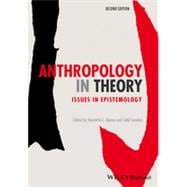- Provides a comprehensive selection of 60 readings and an insightful overview of the evolution of anthropological theory
- Revised and updated to reflect an on-going strength and diversity of the discipline in recent years, with new readings pointing to innovative directions in the development of anthropological research
- Identifies crucial concepts that reflect the practice of engaging with theory, particular ways of thinking, analyzing and reflecting that are unique to anthropology
- Includes excerpts of seminal anthropological works, key classic and contemporary debates in the discipline, and cutting-edge new theorizing
- Reveals broader debates in the social sciences, including the relationship between society and culture; language and cultural meanings; structure and agency; identities and technologies; subjectivities and trans-locality; and meta-theory, ontology and epistemology









